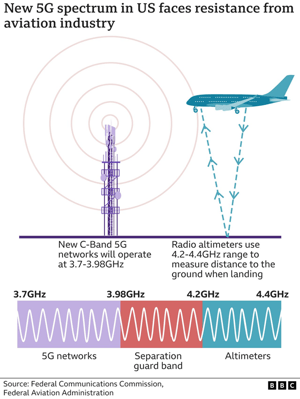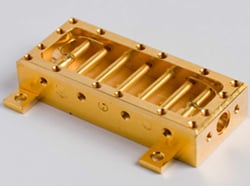The recent launch of the faster high-band 5G (C-Band 3.7-3.98 GHz spectrum) cellphone service in the United States hasn’t gone very smoothly as many view that this could impair aircraft safety. While carriers like AT&T and Verizon have invested billions in spectrum and equipment to upgrade their networks, the airline industry has warned that the 5G on the C-Band 3.7-3.98 GHz spectrum rollout could potentially interfere with airplane instruments during low-visibility operations.
5G Frequencies
 Frequencies used for 5G are divided into three groups called high-band, mid-band, and low-band spectrum. The concern is the use of the 5G operating 3.7-3.98 GHz band with a separation layer of protection known as a guard band 3.98-4.2 GHz on 5G towers near aircraft flight paths could cause interference with the aircraft radio altimeters that operate on 4.2-4.4GHz.
Frequencies used for 5G are divided into three groups called high-band, mid-band, and low-band spectrum. The concern is the use of the 5G operating 3.7-3.98 GHz band with a separation layer of protection known as a guard band 3.98-4.2 GHz on 5G towers near aircraft flight paths could cause interference with the aircraft radio altimeters that operate on 4.2-4.4GHz.
These altimeters help pilots and aircraft measure how high they are above the ground during rain, fog, and other poor weather conditions. Altimeters send out radio waves to determine a plane’s location relative to the ground and other objects.
If an altimeter’s waves don’t bounce back because of 5G interference signals that emanate from a nationwide denser forest of 5G cellular towers, the altimeter could give the wrong reading or not function at all.
FAA 5G Guidelines
The Federal Aviation Administration (FAA) has said 5G 3.7-3.98 GHz networks could disrupt aircraft operations when flying within a mile of a 5G tower with 3.7-3.98 GHz service enable. But it’s not just commercial aircraft that could be affected. Other aircrafts using traditional landing strips, such as aircraft that service air ambulances have been identified as scenarios where the new 5G service interference could be an issue.
Airlines and Altimeter Interference
According to the FAA, the C-Band 5G issue also can affect other on-board systems. Those include the Class A Terrain Awareness Warning Systems (TAWS-A); Enhanced Ground Proximity Warning Systems (EGPWS); Traffic Alert and Collision Avoidance Systems (TCAS II); the Take-off guidance systems, Primary Flight Display of height above ground, Automatic Flight Guidance and Control Systems (AFGCS) These systems could experience anything from intermittent functional issues to total failure, in extreme cases.
More than 40 countries across 175 networks have been able to operate safely with 5G. France’s approach to enabling C-Band 5G service is an obligation to down tilt 5G C-Band transmission beams within buffer zones at airports and heliports. In the US, the complexity of American airspace and the power levels used are higher compared to other countries so approaches adopted in Europe are not possible.
The issue is when aircraft are within a mile of the tower operating 5G C Band service the aircraft altimeter could be blinded (altimeter could give the wrong reading or not function at all) by this new service without appropriate RF filtering fitted to the mobile network and the altimeter.
Two types of interference potentially can affect the radar altimeters: 5G fundamental emissions overcoming the filtering in the altimeter receivers (blocking) and the 5G spurious emissions that land within the 4.2 - 4.4 GHz band directly.
For example, a malfunctioning altimeter could prompt a plane’s computers to warn pilots about phantom obstacles or prevent systems from warning pilots of real threats. 5G on C-Band signals could produce an altimeter disparity of several feet to thousands of feet from an aircraft’s actual altitude, depending on the distance from a tower
Spectrum Control's Filter Solutions
There are answers to this problem. Spectrum Control, formerly API Technologies, is joining with industry players to develop filter solutions to help solve this issue by leveraging our in-house filter engineering and manufacturing expertise. Current altimeter performance can be protected by using RF filter technology.
 Spectrum Control's bandpass filter
Spectrum Control's bandpass filter
Today’s radar altimeters are inherently wideband systems and currently have no requirements for front-end rejection. There is no one size fits all solution to this problem. Essentially there are two types of interference that potentially can affect the radar altimeters: 5G fundamental emissions overcoming the filtering in the altimeter receivers (blocking) and the 5G spurious emissions that land within the 4.2 - 4.4 GHz band directly.
The approach to solving the first element of the problem is an altimeter upgrade with the addition of a bandpass filter that passes the altimeter frequencies of 4.2 to 4.4 GHz and rejects the 5G frequencies of 3.7 to 3.98 GHz improving altimeter resilience from other RF interference. Cavity filters can achieve this while adding a minimum amount of insertion loss to the desirable altimeter signal.
The second element of the problem would be to minimize 5G spurious emissions from the cellular tower that land within the 4.2 - 4.4 GHz band directly. The solution to this problem is to install a bandpass filter at cellular towers which pass the 5G frequencies of 3.7 to 3.98 GHz while rejecting 4.2 – 4.4 GHz.
Spectrum Control's altimeter protector solutions will allow:
- Cellular operators to transmit at higher power levels and keep up with the growing demand of 5G users whilst protecting aircraft safety.
- Altimeter protectors are small, lightweight, and consistent with the existing connectors to allow for easy aircraft retrofit.
Our company has a deep heritage in RF filter technology innovation along with expertise that is second to none. If you are interested in more information about this and other solutions, please get in touch with Spectrum Control for a deeper discussion.
Contact: David J Swift, Global Director of Telecom Sales, Spectrum Control
commercialwireless@APITech.com
.jpg)

 News Blog
News Blog

Let Us Know What You Thought about this Post.
Put your Comment Below.